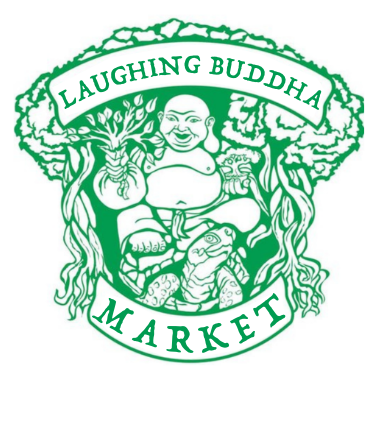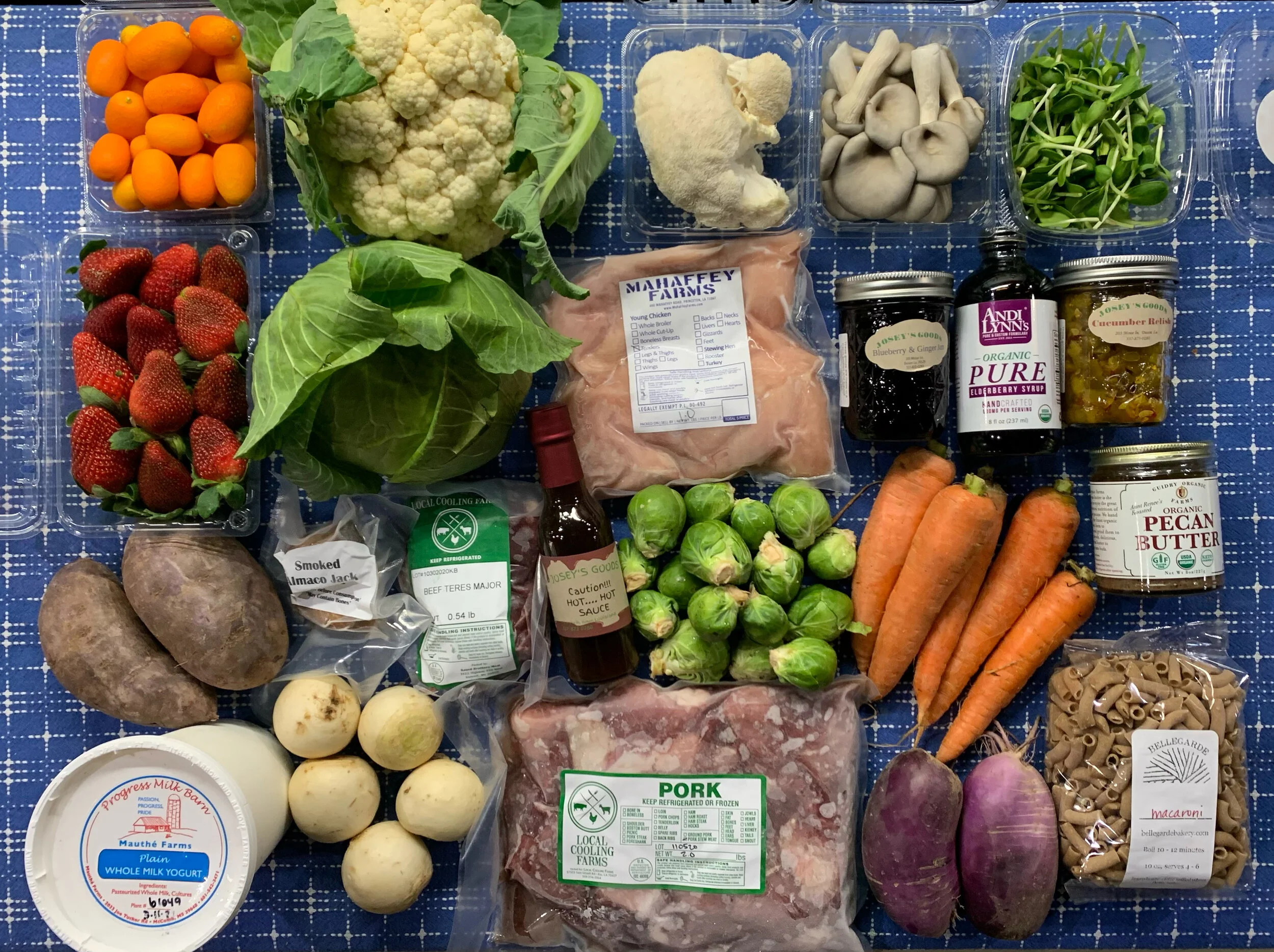Supporting Other Farms and Small Businesses
As farmers ourselves, we take pride in having a business model that supports other farms, too.
Just as much as we believe in a biologically diverse ecosystem, we also believe in the importance of a healthy economic ecosystem, where local farms can feed their own foodshed. As we saw the industrial food system and its complicated supply chain and exploitative practices break down during the COVID-19 pandemic, local farms were there to provide food when grocery store shelves were bare.
One of our core values is to put our money where our mouth is — if we expect you to go out of your way to patronize our farm business, we believe we should be supporting other small businesses and farms as well.
And even if we wanted to go it alone, we couldn’t possibly grow everything we eat, so we take pride in raising meat and eggs in a regenerative way and relying on a cadre of other local farmers and for produce, poultry, dairy and rice and value-added products like ferments, preserves, pasta, bread, coffee, tea and more.
Nancy Blackall, our favorite Fermentista, of Succotash Ferments.
Organic and Regenerative When Possible
We utilize regenerative practices on our own farm and we prioritize buying from farmers using organic and regenerative practices. However, particularly for items that are difficult to grow organically — especially strawberries — we’ve opted to buy from local farms and offer those products rather than not including them at all.
While we’d prefer that all our produce in particular could be grown using organic methods, we recognize that all farmers do their best for their land and make choices based on their specific context. And we appreciate that if we hope to encourage farmers to change their practices, we are more likely to influence them over the long term by being a paying customer.
Van and Dorothy Killen and their children at their vegetable farm in Flora, Miss. Two Dog Farms uses organic practices, but is not certified organic at this time.
Transparency and Integrity
Transparency is key and is of tantamount importance to us. As such, every item in our online cart has a brief description of the farm and its growing practices and we leave it to you to decide if organic methods are important to you. If we created a new item and missed putting a description for the farm and their practices in, please don’t hesitate to point it out and ask us!
Imperfect produce we take home and cook ourselves!
Minimizing Food Waste
With our ala carte offerings (versus a box where the customer doesn’t choose everything that goes in it), it was really important in the beginning to base our orders with our vendors off of your pre orders so that we knew the majority of what we ordered was already claimed. You’d be surprised at the whims and trends of customers week to week. Some weeks it seems like everyone wants kale and the next week, no one does!
Since those early days, and change ups to our ordering software and increase in volume of orders, we’ve just relied on what we’ve learned about retail tastes to still order carefully, regarding what will sell quickly, what items last better in what seasons, etc. (For instance, did you know greens keep longer when the harvest temperature is lower? So kale from the same farm, is the same variety, grown in the same soil may have a much longer fridge life in January than in April.)
In the case of large quantities of produce that we’ve ever had too much of, we usually freeze, preserve or coordinate with Succotash Ferments or Josey’s Goods to ferment, pickle or otherwise preserve the item for our personal supply or for resale.
Every day, as our staff packs orders, they cull out any not ideal produce items, I then sort out anything Grant and I can eat and the rest (though usually not much!) goes to the pigs or the chickens.
Because of the farm, we’ve also gotten to the point where other farms or vendors will send their food waste for the pigs and the chickens.
So all around, virtually 0% of our food ends up in a dumpster and most of it ends up feeding you as designed. And some less than ideal stuff ends up in our bellies or in the pigs and chickens’ bellies.
Sows and piglets eating some over ripe heirloom tomatoes donated by a local distributor.
Low Waste and Intentional Packaging
We aim to pack your orders with minimal packaging, within reason for properly storing items.
First, we try to use recycled bags, egg cartons and plastic clamshells whenever possible. And we don’t pack vegetables in tons of individual bags if that’s unnecessary. While we no longer reuse other brands of egg cartons, our neighbors can use them, so we still can accept them to be reused.
We ordered compostable “plastic” bags and brown paper grocery bags for the first time ever in May 2020. For years before that, we had gotten by purely on recycled bags and boxes and still prioritize using those when we can.
There are a few items we get in plastic clamshells — Screaming Oaks Mushroom Farm mushrooms, Compostella Farm salad greens and seasonal strawberries, blackberries and blueberries. Food waste is a bigger concern to us than being able to somehow eliminate plastics entirely.
Greens in particular last longer in clamshells because they do better in the fridge with air in their container. With a plastic bag and some kind of knot or tie, air often comes out and causes the greens to turn/get slimy faster. We don’t want that happening in your fridge and and we especially don’t want it happening on our watch. So we feel that stackable clamshells are a necessary evil that preserves those precious greens longer.
Berries are apt to get bruised and beaten up if not protected by clamshells. Mushrooms need to breathe, but selling loose or in paper bags causes bruising and bits to fall off and be wasted as they’re getting transported around from Screaming Oaks to us to you.
Finally, all meat and seafood is sold in plastic vacuum sealed packages. This is simply the best “technology” for preserving meat/seafood the longest. And, we’re able to use most of the cardboard boxes that produce and meat come in as bedding for our piglets in their deep litter hoophouse.
Overall, we focus on the big environmental picture and while we can acknowledge that we are not perfect and have areas we can improve, we try not to let the perfect get in the way of the good or the better. It’s a balance of values, always.
Food Packaging That We Can Reuse
For years, we have taken back tons of food packaging materials and have reused whatever we can, and recycled the rest. Now we are trying to streamline the materials we accept!
clear pint & quart clamshell containers
green pint basket containers
plastic bags
paper bags
mylar bags
South of Eden kombucha bottles
*please clean all recyclables prior to donation
OTHER PLACES THAT CAN REUSE YOUR STUFF:
COMPOST: The Compost Network, Compost NOW, Schmelly's
GLASS: Glass Half Full, Target, Tulane Newcomb Art Department, Whole Foods
ORLEANS & JEFFERSON PARISH RECYCLING GUIDELINES:
plastic # 1 & 2
paper
boxboard
corrugated cardboard
shredded paper
aluminum and steel food cans
SPECIALTY DROP OFF ITEMS:
Glass, E-waste, light bulbs hazardous materials shredded paper, Mardi Gras beads, batteries.






